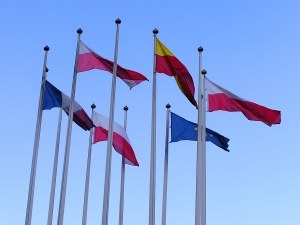

With Microsoft moles inside many governments (we gave lot of examples) it is no wonder that taxpayers don't have their interests served. As a bit of a primer, consider going through the following Wiki pages:
"Over in Italy, rogue actions are being reported as people try to stall the famous migrations to FOSS."Recall what Microsoft did about imminent ODF preference in France. It used proxies to derail the democracy and promote OOXML, i.e. Microsoft formats as a 'standard' [1, 2, 3, 4].
Speaking of people who boosted OOXML (e.g. Winterford in this case, the writer who became a Microsoft booster after receiving gifts from Microsoft [1, 2]), they are demonising FOSS, comparing the FOSS advocates to "crusaders" and even showing a photo of a medieval shield. The truth is exactly the opposite. The crusaders are the foreigners (multinationals) who try to impose proprietary software on populations across the world. Winterford must not be happy to see ODF elevated in his nation, Australia. He did a lot to promote OOXML after Microsoft had given him gifts.
"Microsoft can sometimes make the Italian Mafia look benign in comparison."Over here in the UK, policy is being put in place which favours local companies like my employer (FOSS only). Pogson writes: "There it is, a whole government planning how to escape M$ and “partners” bloat. They are going to do IT the right way, considering what will give the desired outcome efficiently instead of just throwing money away to get the desired outcome any way possible. If we all did that would anyone pay ~$100 extra for a PC with M$’s OS on it, $150 extra for M$’s office suite, $thousands to run a server on a network? How about enduring endless malware aimed at the leaking hulk of that other OS and endless re-re-reboots?"
Over in Italy, rogue actions are being reported as people try to stall the famous migrations to FOSS. To quote: "The discussion in the working group that is supposed to detail when Italy's public administrations should prefer open source over proprietary solutions, is stalling, says lawyer Ernesto Belisario, professor at University of Basilicata in the city of Potenza. "Some of the members think the law stipulates a technical and economical assessment, instead of reading it as a statement supporting open source.""
"The fight for FOSS in the public sector does not end when policies are written."Recall the role played by Nichi Vendola. Microsoft can sometimes make the Italian Mafia look benign in comparison. Microsoft is desperate to stop FOSS expansion in Italy and some other news from Italy is now properly summarised in our Wiki.
The article above notes that "Carlo Piana, member of the working group on behalf of the Free Software Foundation Europe and the KDE foundation, confirms that the members do not agree on the reading of the law. "It is important that we agree on the interpretation as soon as possible, otherwise the working group will fall short on its tasks. "I don't believe this will be the outcome, but if the current position persists, the communities I and the other members represent will strongly protest and we will have little choice but to take all the consequences on our contribution."
"I am sure that the organisation will realise that this is a crucial point. The law clearly supports our position, for many good reasons. While we are aware that some level of compromise is necessary, this cannot be on the substance of the law and on the very mission of our activity. As Mr. Belisario correctly says, some may disagree with the law, in which case they can try to change it; but as long as it remains unchanged, the law must be abided with."
"One strategy for impeding FOSS growth in Europe has been lobbying for FRAND and the unitary patent (software patents in Europe through the back doors). "The fight for FOSS in the public sector does not end when policies are written. Just look at what Microsoft did in Brazil to bypass policies.
One strategy for impeding FOSS growth in Europe has been lobbying for FRAND and the unitary patent (software patents in Europe through the back doors). Matthias Lamping does not think that the EU should embrace this trajectory for patents. He writes in a pro-patents blog that he "is not a big fan of the unitary patent package - not because it dislikes the idea of unitary patent protection for the Internal Market, but precisely because [he] does like it. However, creating a "unitary patent" which claims EU origin but disclaims EU character, just because something is supposedly better than nothing, is rather an act of desperation than sensible policy making. This is not the place and not the time to repeat old arguments, but [despite Merpel's warning that this might offend the sensibilities of some readers] one thing cannot be said often enough: False integration can be worse than no integration; and a bad court system is not necessarily better than no court at all. It may be true, to a certain extent, that the system can be improved once it is in force. But a house built on a shaky foundation will always be in danger of collapsing, no matter how many cosmetic repairs are made."
It seems possible that, owing to pressure from countries like Spain, the unitary patent package will fall through. Gérald Sédrati-Dinet, the loudest opposer of the unitary patent package, said the other day:
that's why I'm now 99.9999% sure that #UnitaryPatent will die, but what a waste of time/energy and political confidence!